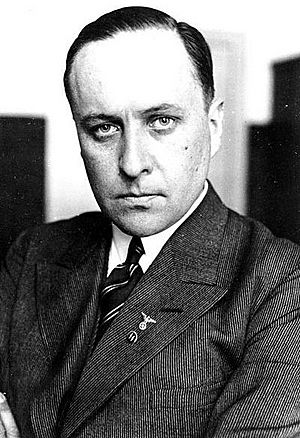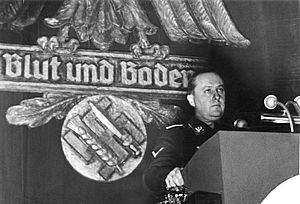Richard Walther Darré facts for kids
Quick facts for kids
Richard Walther Darré
|
|
|---|---|
 |
|
| Reich Minister for Food and Agriculture | |
| In office 29 June 1933 – 6 April 1944 (On leave from 23 May 1942) |
|
| Chancellor | Adolf Hitler |
| Preceded by | Alfred Hugenberg |
| Succeeded by | Herbert Backe |
| Chief of the SS Race and Settlement Main Office | |
| In office 1 January 1932 – 12 September 1938 |
|
| Preceded by | Office established |
| Succeeded by | Günther Pancke |
| National leader (Reichsleiter) | |
| In office 3 June 1933 – 23 May 1942 |
|
| Personal details | |
| Born |
Ricardo Walther Óscar Darré
14 July 1895 Buenos Aires, Argentina |
| Died | 5 September 1953 (aged 58) Munich, West Germany |
| Nationality | German |
| Political party | Nazi Party |
| Alma mater | University of Halle |
| Profession | Agronomist |
| Cabinet | Hitler cabinet |
| Military service | |
| Allegiance | German Empire |
| Branch/service | Imperial German Army |
| Rank | Leutnant SS-Senior group leader (SS-Obergruppenführer) |
| Battles/wars | World War I |
Richard Walther Darré (born Ricardo Walther Óscar Darré; 14 July 1895 – 5 September 1953) was an important figure in the Nazi Party in Germany. He was known for his ideas about "blood and soil" (Blut und Boden), which connected people's race to the land they lived on. Darré served as the Reich Minister of Food and Agriculture. He was also a high-ranking official in the Nazi Party and the SS.
Contents
Early Life and Education
Richard Walther Darré was born in Belgrano, a neighborhood in Buenos Aires, Argentina. His father was German, and his mother had Swedish and German roots. The family lived well and educated their children at home.
When Darré was nine, his parents sent him to school in Heidelberg, Germany. In 1911, he studied in Wimbledon, England, as an exchange student. The rest of his family moved back to Germany in 1912. Darré then spent two years at a school in Gummersbach. Later, he attended a colonial school in Witzenhausen, which sparked his interest in farming.
After a short time at the school, he joined the army and served during World War I. He was wounded a few times. After the war, he wanted to return to Argentina to farm. However, his family's money problems made this impossible. He went back to Witzenhausen to continue his studies. He also worked as a farm assistant in Pomerania.
In 1922, he moved to the University of Halle to study agriculture. He focused on animal husbandry, which is about raising farm animals. He finished his studies in 1929. During these years, he also worked in East Prussia and Finland.
Darré was married twice. In 1922, he married Alma Staadt, and they had a daughter named Anneliese. They divorced in 1927. In 1931, he married Charlotte Freiin von Vittinghoff-Schell, and they had a daughter named Elin.
Developing Political Ideas
As a young man, Darré joined the Artaman League. This was a youth group that believed in returning to a simple life on the land. Here, he started to develop his "Blut und Boden" (Blood and Soil) idea. This idea linked the future of the Nordic race to the land. "Blood" meant a person's race and family history. "Soil" meant the land they lived on and farmed. The idea was that people and their land had a long-term, important relationship.
Darré believed that German farms should be passed down to one son, usually the strongest. He thought this would keep the best farmers on the land. He also wanted to improve the "purity" of the Nordic race through certain practices.
Some people see Darré's early writings as being about "Green" or environmental ideas. They say he supported more natural ways of farming. He also emphasized protecting forests and giving farm animals more space. However, other experts disagree. They say his ideas were strongly linked to the Nazi way of thinking.
Heinrich Himmler, another important Nazi leader, was influenced by Darré's ideas. Darré also praised "peasant virtues." He believed these virtues were found in people living in the countryside. He did not like city life as much.
In his main books, Darré described German farmers as a pure racial group with Nordic roots. He thought they were the most important part of the German nation. He also worried that the Nordic race was in danger because its birth rate was lower than other groups.
Joining the Nazi Party
In July 1930, Darré met Adolf Hitler and joined the Nazi Party. He also became a member of the SS. On January 1, 1932, Heinrich Himmler, the chief of the SS, made Darré the head of the new SS Race and Settlement Main Office. This group focused on racial policies and checking the racial background of SS members. Darré was promoted to a high rank in the SS.
Darré worked to get farmers to join the Nazi Party. He wanted to use problems in the countryside to gain support against city governments. He also wanted to make farmers strong Nazi supporters. He hoped to create a group of people who could settle new lands in the East, replacing the Slavs.
Historians say Darré, Himmler, and Alfred Rosenberg were leaders of a group within the Nazi Party. This group supported anti-industry and anti-city "blood and soil" ideas. They also wanted Germany to expand into Eastern Europe to gain more "Lebensraum" (living space). They believed Germany should focus its goals on Europe and try to be allies with Britain.

On June 29, 1933, Hitler appointed Darré as the Reich Minister of Food and Agriculture. He also became the Reich Farmers Leader. Darré helped create the Nazi Reich Food Society (Reichsnährstand). This was part of the Nazi effort to control all parts of German society.
Darré pushed for a law called the Hereditary Farm Law (Reichserbhofgesetz). This law forced most small farms to become hereditary estates. This meant they had to be passed down from father to son forever. The law protected farmers from losing their land due to debt. However, it also meant they and their children could never sell or mortgage their farms.
At a Nazi agricultural school, Darré promoted ideas of Nordic racial purity. He called this the "New nobility of blood and soil." He had photographers take pictures of young farmers exercising. These pictures were used in Nazi propaganda.
Darré developed a plan called "Rasse und Raum" (race and space). This plan was about expanding German territory to the east. It was based on Hitler's ideas of "living space" for the German people.
Darré greatly influenced Himmler's goal to create a German racial elite. These extreme Nazi policies led to the deaths of millions of non-Germans. Later, Himmler and Darré disagreed. Himmler thought Darré was too focused on theories and not good enough at managing things.
Losing Influence
Darré's importance began to decrease. Hitler and Himmler felt he was too much of a thinker and not a good leader. By September 1938, Himmler wanted Darré to step down as head of the SS Race and Settlement Main Office.
On May 23, 1942, Darré was given a long leave of absence from his role as Reich Minister. His duties were taken over by Herbert Backe. Darré officially remained Minister until 1944, but he was no longer active. He spent his time at his hunting lodge near Berlin until the end of the Nazi rule.
After the War
In April 1945, American forces arrested Darré. He was held and later tried at the Nuremberg Trials. This was a series of trials for important Nazi officials. Darré was one of 21 people tried in the Ministries Trial.
He was found guilty of some charges, including crimes against people and stealing property. He was sentenced to seven years in Landsberg Prison. Darré was released in 1950. He spent his last years in Bad Harzburg, Germany. He died in a hospital in Munich on September 5, 1953, from liver cancer. He is buried in Goslar.
His Writings
Darré's books mainly focused on the history and ideas of Nordic farmers. He wrote about his "blood and soil" ideology. In his two main books, he criticized Christianity. He believed its teaching of "equality of men before God" had weakened the "moral foundations" of the German nobility.
- Das Bauerntum als Lebensquell der nordischen Rasse (Peasantry as Life-source of the Nordic Race) (1928)
- Neuadel aus Blut und Boden (New Nobility from Blood and Soil) (1930)
Images for kids
See also
 In Spanish: Walther Darré para niños
In Spanish: Walther Darré para niños
- Hunger Plan
- List SS-Obergruppenführer
- Nazism and race
- Reich Harvest Thanksgiving Festival
- Ecofascism
 | Shirley Ann Jackson |
 | Garett Morgan |
 | J. Ernest Wilkins Jr. |
 | Elijah McCoy |


